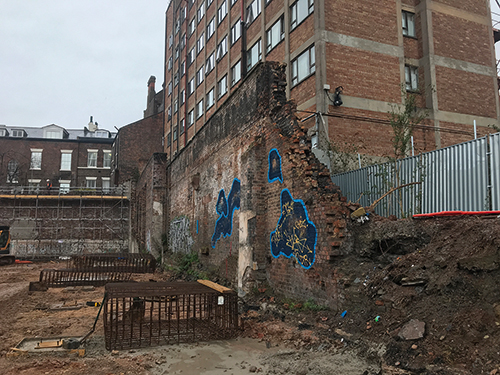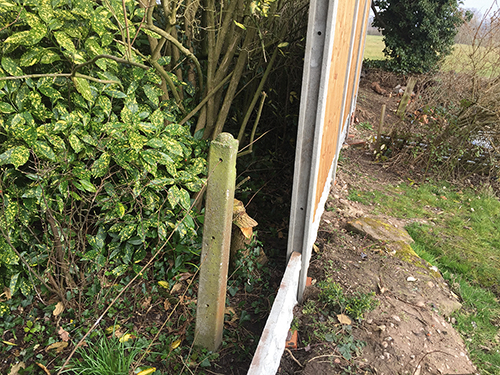 Who would have thought that Brexit – or the lack of it – would significantly affect the way in which the industry manages boundary disputes? Richard Crow, associate director of Trident Building Consultancy, explains:
Who would have thought that Brexit – or the lack of it – would significantly affect the way in which the industry manages boundary disputes? Richard Crow, associate director of Trident Building Consultancy, explains:
Two years ago a Private Member’s Bill, sponsored by Lord Lytton, received its first reading in the House of Lords. The Bill suggested that boundary issues could be better addressed by using a structure which broadly replicates the provisions of the Party Wall Act – essentially removing much of the responsibility from solicitors and handing it to surveyors. Progress of the Bill was thwarted by the general election of June 2017, and with parliamentary time apparently unavailable to advance the legislation it is yet to have its second reading in the Lords. The delay is frustrating, but it also provides some necessary reflection time.
Breaking boundaries
There is undoubtedly a need to reform legislation which can cost individuals as much as £20,000 for trimming a hedge – as well as costing them their relationship with their neighbours. And as large scale development is rushed into existence to address the housing crisis, landowners will increasingly seek boundary dispute services to maximise their landholding prior to development.
Lord Lytton’s Property Boundaries (Resolution of Disputes) Bill aims to reduce costs and expedite the resolution of property boundary disputes. Its mandatory dispute resolution scheme involves one neighbour serving a formal notice on the other, along with a plan indicating where they believe the boundary lies. If the neighbour disagrees, then a dispute is deemed to have arisen.
 Either a surveyor is instructed jointly (which is encouraged to both limit costs and bring about openness), or individual surveyors are appointed by each party and a third independent surveyor instructed to make the final decision. Surveyors must be members of either RIBA, RICS or ICE and must adhere to the RICS code of conduct, regulations and RICS professional guidance regarding measured surveys of land, buildings and utilities and boundaries. The surveyors’ findings are regarded as conclusive unless an appeal is made to the High Court within 28 days. When that period expires without appeal, both parties must inform the Land Registry.
Either a surveyor is instructed jointly (which is encouraged to both limit costs and bring about openness), or individual surveyors are appointed by each party and a third independent surveyor instructed to make the final decision. Surveyors must be members of either RIBA, RICS or ICE and must adhere to the RICS code of conduct, regulations and RICS professional guidance regarding measured surveys of land, buildings and utilities and boundaries. The surveyors’ findings are regarded as conclusive unless an appeal is made to the High Court within 28 days. When that period expires without appeal, both parties must inform the Land Registry.
Reservations
There are notable omissions. Not all boundary disputes are captured by the Bill – specifically leasehold land. That means two adjoining leaseholders cannot determine a boundary dispute without the authority and approval of the freeholder(s). That may not appear to be an issue at first sight; however, the freeholders may have no interest with such boundary issues or may no longer be contactable, as contact details have changed over the passage of time. If the tenant’s occupational use of the land is infringed due to encroachment, for example, who would the leaseholder turn to if they could not self-manage this process?
Furthermore, the Bill does not appear to authorise the surveyor to instruct a landowner to remove a structure on a neighbour’s land or award compensation. As a consequence, there is an increased likelihood of aggrieved parties using the appeal route of the High Court – ironically, adding an extra layer to the process and ultimately more legal costs.
The Bill imposes criminal sanctions on those who prevent the service of the boundary dispute notices, but there is no reference to property owners who prevent surveyors from inspecting the property. And we need more clarification on how the new procedures would work with existing rules and procedures on adverse possession or the acquisition of rights of way through the Land Registry.
 Finally, due to the current system, there are very few surveyors with expertise in this area. When I undertook the RICS Expert Witness Accreditation Scheme certification recently, I was one of just three who attained the accreditation. Perhaps the lack of those suitably qualified reflects the fact that there are currently no minimum standards for boundary dispute advisors, but if the new legislation comes into effect we would require substantially more qualified experts – ideally those who combine the experience of land surveying and building surveying, as I do.
Finally, due to the current system, there are very few surveyors with expertise in this area. When I undertook the RICS Expert Witness Accreditation Scheme certification recently, I was one of just three who attained the accreditation. Perhaps the lack of those suitably qualified reflects the fact that there are currently no minimum standards for boundary dispute advisors, but if the new legislation comes into effect we would require substantially more qualified experts – ideally those who combine the experience of land surveying and building surveying, as I do.
And, although the Bill aims to avoid adversarial adjudication, it requires a decision to be forced on both parties. The proposed system does not allow for the parties to mediate should they wish to do so. That can be criticised as undemocratic, with the potential to set a dangerous precedent.
Boundary disputes are a messy business – and so, it would seem, is boundary dispute legislation. I am fully in support of change and welcome Lord Lytton’s initiative, but clearly it requires further consideration before – hopefully – the Brexit cloud lifts one way or another and necessary legislation such as this is once again visible on the horizon.